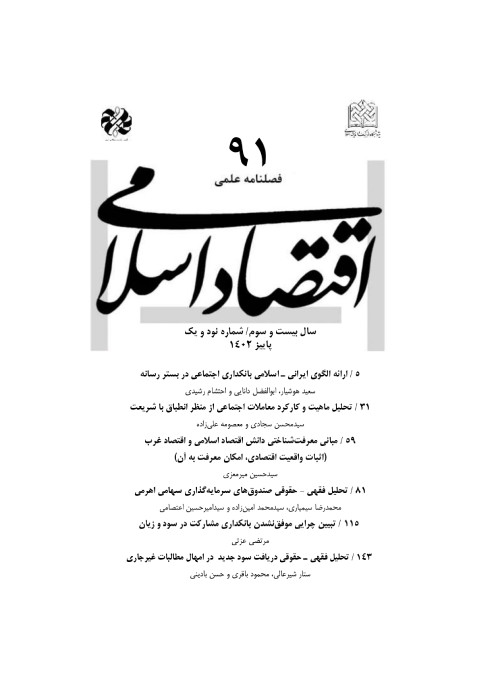An Economic-Jurisprudential Analysis of Transferring Net Profit from Capital to Labor
Author(s):
Abstract:
Production firms, after subtracting all costs including opportunity and accounting costs, usually gain net economic profit. According to the capitalistic economy’s foundations and the relations established in that regime, this profit belongs to capital and its owner. Net economic profit’s belonging to capital and paying a minimal fixed wage to the skilled, semiskilled and ordinary labor forces have led to the society’s wealth and income’s being intensely concentrated in the hands of some few people. Statistics reveal that wealth and income gap is increasingly getting more severe. The stability of this gap’s growth leads to the stability of poverty in the society. Thus, all the economic systems have remarked their opinion about this kind of profit, and try to adjust, transfer or remove it in the economic relations. Capitalism suggests the perfect competition market model as an instrument for removing the net profit belonging to the capital. However, since perfect competition market is just an unreachable ideal, it hasn’t been successful to do so. Socialism describes abolishing private property and omitting profit principle from economic relations as the solution for removing net economic profit belonging to capital, whose outcome has been vast public poverty. The present article argues that the most appropriate model for solving the problem is that of integrative cooperative economy. Besides determining a suitable reward for capital, this model transfers the net economic profit to the skilled, semi-skilled and ordinary labor forces on the basis of their contribution in its production. Income and wealth distribution, thus, is done in such a way that adjusts the income and wealth gap, provides the favorable propensity, and constrains and reduces poverty. The present article, therefore, using descriptiveanalytical approach, examines these models, and explicating the integrative cooperation on the basis of Islamic teachings, shows that this kind of cooperation manages to transfer net economic profit to labor, and distributes it, within the economic model, between those actually contributing to its production.
Keywords:
Language:
Persian
Published:
Islamic Economy, Volume:14 Issue: 55, 2014
Page:
121
magiran.com/p1404213
دانلود و مطالعه متن این مقاله با یکی از روشهای زیر امکان پذیر است:
اشتراک شخصی
با عضویت و پرداخت آنلاین حق اشتراک یکساله به مبلغ 1,390,000ريال میتوانید 70 عنوان مطلب دانلود کنید!
اشتراک سازمانی
به کتابخانه دانشگاه یا محل کار خود پیشنهاد کنید تا اشتراک سازمانی این پایگاه را برای دسترسی نامحدود همه کاربران به متن مطالب تهیه نمایند!
توجه!
- حق عضویت دریافتی صرف حمایت از نشریات عضو و نگهداری، تکمیل و توسعه مگیران میشود.
- پرداخت حق اشتراک و دانلود مقالات اجازه بازنشر آن در سایر رسانههای چاپی و دیجیتال را به کاربر نمیدهد.
In order to view content subscription is required
Personal subscription
Subscribe magiran.com for 70 € euros via PayPal and download 70 articles during a year.
Organization subscription
Please contact us to subscribe your university or library for unlimited access!


